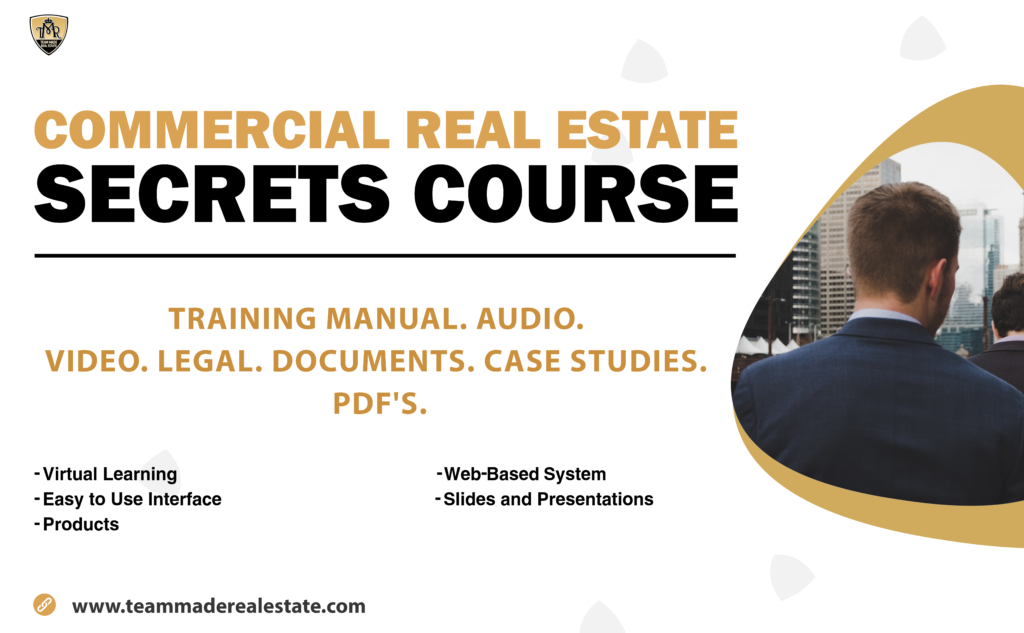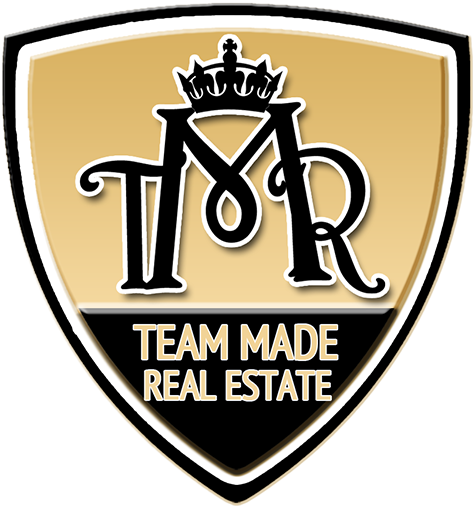COMMERCIAL REAL ESTATE SECRETS COURSE

Introductory Preview
As progress is made in your real estate investment career, you will become attracted to the allure of commercial properties and the bigger profits they often provide. Getting involved in commercial investment is a logical growth path for investors.
This course goes into commercial investment and outlines the various components from an investment viewpoint. If you are a new investor with limited resources, it is not recommended that you attempt to dive in too quick. Doing so could be hurtful to you and serve to discourage you as an investor. To delve into this area, you need to be well capitalized (have money behind you). It is quite easy to run out of money when investing in commercial real estate. At the very least you need to have some capital behind you and have a good commercial real estate agent representing you.
It is better to begin your investment career by building your cash reserves, gaining experience, and have large multi-million-dollar commercial investment as a goal. This approach could include acquiring a smaller building with some commercial components and a couple of apartments on the top floor as an example. Assemble some investor colleagues to purchase a building together and share in the learning curve as an example.
The Deal Architect Process
Real estate is a fairly simple investing strategy. It seems far more complex than it is because there are so many variables involved and several ways to handle each variable that you choose.
As a Deal Architect, you need to learn that being creative in solving the problems you encounter will ensure your success. There is always more than one approach for investments, so let your creativity be your guide.
Presented here are the three characteristics you need to work on or possess to be an effective Deal Architect. We are breaking them down into their essential elements to clarify and simplify the pathway to success. These steps are:
1. Acquire the necessary skills that allow you to look for problems and find creative solutions. Even if your only skill is the ability to find great deals, you can still become exceedingly wealthy. Money is not the key to success; in fact, it can be a hindrance to because it gives you the ability to buy into bad deals that you did not complete proper due diligence prior to committing yourself. Most successful real estate investors will tell you that when you are starting out, less money equates to a higher desire and drive to succeed.
2. Leverage the necessary tools that allow you to use your creativity in a changing and flexible manner as the market changes. Knowing and observing the market conditions are vitally important, as you will constantly and consistently need to change your strategy as the market changes. Once again, all successful real estate investors will tell you that the ability to observe and understand the market conditions allows them the flexibility to adapt their strategies and remain profitable and successful in good times and not-so-good times.
3. Cultivate and maintain a positive attitude. Many people have that “inner voice,” in their head that screams “they cannot succeed at something,” or that softly whispers consistent negative thoughts about their success, lack of it. Unfortunately, it is this subconscious voice that controls your reality, so if you do not believe you can succeed at something for whatever reason, then certainly you will not. Belief is fundamental to your success, because:
Skills + Tools + Attitude = Success
When preparing for success, genuinely think of yourself as a Deal Architect and do not let anything or anyone dissuade you from this belief. Keep your mind open to making good deals. Determine what you must work with, keep your eyes open, and go out and craft profitable deals. Remember, there exists multiple ways to make a profit in the commercial real estate space, so do not let good opportunities pass you by because of a lack of creative thinking. Your attitude should be “there are so many good deals in the market, I only have to choose a few.”
The Fundamentals of Commercial Real Estate Investing
There are six fundamentals associated with becoming a Deal Architect. They are:
- Your Cash. There are numerous investment strategies that are chosen primarily based on your personal cash situation and your individual preferences, and there is not a “one size fits all.” Before you start investing, it is important to understand what resources you have to work with. Once you know this, you can identify what other resources you will need to access. Understand that even if you do not have cash and credit, there are many areas where you can contribute and create deals (and the profit they generate). You can also use other sources of cash aside from your own.
- Your Passion. Every successful investor without exception has allowed themselves to identify their life’s passion. Once they have identified what they want most out of life (and it usually is not money), their motivation and positive thinking is stimulated, guiding them to their success.
- Your SMART Goals. Specific. Measurable. Achievable. Realistic. Timely. Goal setting and review of those goals on a regular basis is another common characteristic of the successful. Their goals are specific and categorized as short, medium, and long term. When you do not have a destination in mind, then any direction will take you there – meaning nowhere.
- Your Credit. There are ways to make money in real estate with poor credit; however, having good credit gives you more options to pursue. As you become successful and build your credit accordingly through proper credit management, your success is almost assured. You can also leverage other sources of credit aside from your own.
- Your Market. Knowing the ebbs and flows of your market dynamics is indispensable. When you get to the point where you can predict market changes reliably, not only will your investments become dramatically more profitable, but you can also begin to insulate your current and future real estate investment decisions.
- Your Knowledge of Real Estate understood. All real estate deals can be broken down into six basic building blocks, and we present this concept as being related to a DNA chain that maps out the replication of a living cell. If you copy the building blocks in a systematic manner you will achieve identical results.
The Deal Architect Plan
With an aim to systematizing (and making it easy to understand and follow) the real estate investment process, we can segment the Plan into five basic steps. If these steps are done properly, risk can be managed. The following applies:
- Find and Filter the Deals: To save time and become efficient at finding motivated flexible sellers you must focus on methods that bring the sellers to you. Your advertising should be focused on finding motivated sellers. What you want to uncover are people who need to sell their property, not those who want to sell. There is a huge difference. Also understand that you are not taking advantage of these people by uncovering their problems that cause their motivation. As a Deal Architect you are helping to solve their problems and are finding deals where you can both benefit.
- Structure the Deal: Determine the parameters that will allow you to structure a good deal based on the circumstances. When the seller is motivated, they are likely willing to take back some of the financing, or alternatively give you a great price. There must be an advantage for both in the deal as you help them out of a problematic situation.
- Write and Secure the Offer: After you understand what the seller’s needs are, present an offer that satisfies those needs. Then get the property under contract, hence giving you the right to purchase or assign later as you decide.
- Complete Your Due Diligence: Most of your due diligence efforts (except for the preliminary part used to filter deals) are done after you have secured an offer. It would be a large waste of time and money (and likely an impossible task) for you to perform due diligence on all properties you see, the large majority of which you are not going to buy. Once you have written and secured an offer, it is the time to investigate the financing, the tenants (if applicable), the documentation, and so forth.
- Close or Pass: Based on your due diligence, you now make the decision to either close on the property or pass it by.
The DNA of Real Estate
To better enable you to move forward as a Deal Architect, the essential ingredients involved in making good deals can be broken down into a process of specific steps that are easy to follow. These procedural steps provide you with a mechanism where you can repeatedly generate good deals.
We call this the DNA of Real Estate as an analogy to a DNA chain for a living cell, where the DNA allows the organism to replicate itself exactly every time. Knowing these essential elements, you can focus and execute sequentially on each one that you need for each deal as you steadily move toward your goals. These elements are Control; Acquire; Fund; Amplify; Stream; and Exit. Let us take a walkthrough these elements:
- Control: Control of a property allows you to either purchase that property or sell your control to another investor.
- Acquire: Acquiring a property is when it transfers from one party to another. If your strategy is simply to “wholesale” a property (e.g., through an assignment) then acquiring is not necessary.
- Fund: Funding a property is making the necessary (sometimes creative) financial arrangements to buy the property, assuming you have the cash to do so. Once again, if your strategy is simply to “wholesale” a property (e.g., through an assignment) then this step is not necessary.
- Amplify: Amplifying a property are those plans to increase the value of a property.
- Stream: Streaming is simply providing for a positive cash flow from the property.
- Exit: This is applying your Exit Strategy when the time is right based on your plan. Exiting is particularly important, and you should not proceed with a deal unless you have one or more exit strategies planned, even if that strategy is intended to be used many years later.
The Following is the Course Chapters Manual Outline:
1: Preparing for Success
2: Defining Commercial Real Estate
3: The Benefits and Disadvantages of Commercial Real Estate
4: Types of Commercial Real Estate
5: Finding and Filtering Deals
6: Structuring Commercial Deals
7: Writing and Securing Offers
8: Performing Due Diligence
9: Amplifying Property Values
10: Full Contact Property Management
11: Commercial Case Studies
Appendix A: Glossary of Commercial Terminology
Copyright Team Made Real Estate™ | All Rights Reserved.

